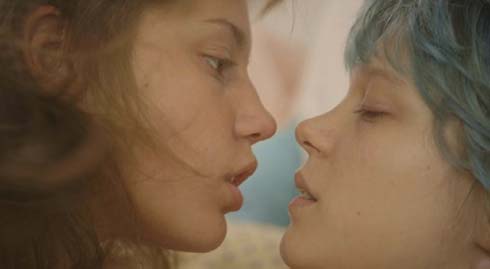This weekend I watched two movies about love. Both dealt with young women in search of themselves, young women in search of love, young women who had to struggle with loss and with being misunderstood.
One of the films got great reviews and won prestigious awards. One of the films was a bit of a flop.
Now, I know I’m not a film critic, or a critic of any kind. I’m just a person who has been watching movies and TV for a lot of decades. Even though one of the letters on my Myers-Briggs is a J for judging, I am not a judgmental, critical minded person. I’m easy to please where entertainment is concerned.
So when I see two films that are very alike in theme and subject matter, it makes me wonder what sets them apart. Is the quality of the acting? The skill of the director? The originality of the script? I want to come back to this, but first let me explain the two stories I’m talking about.
The two films are Blue is the Warmest Color and Dorfman in Love. If you pay attention to film news, you know that Blue is the Warmest Color is the one that got the great reviews and won awards.
Blue is the Warmest Color

Blue is the Warmest Color is a French film about a young woman, Adèle, played by Adèle Exarchopoulos. It’s three hours long and covers years of Adèle’s life. She falls in love with Emma, played by Léa Seydoux. Emma is older, artistic, and out. When they meet Adèle is still in high school and not clear about her own sexuality. As the years pass, the two women live together for a while but it isn’t a successful long-term arrangement. For years after they part Adèle continues to long for Emma until she finally comes to terms with their parting and walks away from her past. There are long scenes of explicit sex.
Dorfman in Love

Dorfman in Love stars Sarah Rue as Deb Dorfman. She is a grown woman who lives with her dad (Elliot Gould) and works in her brother’s (Jonathan Chase) accounting firm. She has a fantasy love attachment to a friend of her brother’s played by Johann Urb. Deb takes care of everyone in her life, especially the three aforementioned men, who do not appreciate anything she does. Then she meets Cookie, played by Haaz Sleiman. With Cookie’s help, she begins to understand who she is and what her true worth is. She is able to leave her past behind. There is no sex in the film but there are a couple of straight kisses.
Who and How Do We Decide on Great?
In terms of acting, Adèle Exarchopoulos and Léa Seydoux both do a fantastic job. Especially Adèle Exarchopoulos, who has to age from a naive teen to a responsible adult before our eyes. But the acting in Dorfman in Love was perfectly adequate. The actors weren’t called on to do anything especially intense the way the actors in Blue is the Warmest Color were, but does that mean they didn’t act as well as the two French women in the parts they were given?
The approach of the directors in these two films was very different. Blue is the Warmest Color was full of close-ups, often focused on the two women in minute detail. Dorfman in Love took a much more expansive approach. I found the directing styles suited to the material – they certainly wouldn’t have worked in reverse – but they were perfect for the stories they were telling. One film was a serious examination of a young woman’s maturation and growth, while the other was firmly in the romantic comedy camp of maturation and growth. Is one genre more worthy of success than the other?
Does the intensity of the subject matter, the intensity of the emotion portrayed make one film better than another? Is it the seriousness of the approach vs. the comedic approach? Is it the closed-in focus of one film that makes it better than the more open look of the other – is that somehow more artistic? Does all the daring sex in one make it more weighty?
What I’m getting at here is that secret something that makes one film an international hit and topic of conversation around the globe while the other feels passed over. Somewhere there is a magical line between good and really, really good that these two films exemplify perfectly. But who decides where that magic line is? Critics? Ticket buyers? Award givers? The folks on the living room couch?
And what does that mean to someone who might love Dorfman in Love but finds Blue is the Warmest Color long and tedious? Is that person wrong or someone whose tastes don’t count?
I can’t tell you how many people have told me I should watch Breaking Bad because it’s really, really good. But I cannot bring myself to watch a story about a teacher who sells meth. And I’ve told others they should watch Friday Night Lights because it’s really, really good only to realize they won’t watch a series about football. Is there a right and wrong in this?
I’d really like to know the answers to these questions. I really would.

Leave a Reply